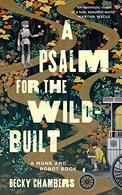
| Series: | Monk & Robot #1 |
| Publisher: | Tordotcom |
| Copyright: | July 2021 |
| ISBN: | 1-250-23622-3 |
| Format: | Kindle |
| Pages: | 160 |
At the start of the story, Sibling Dex is a monk in a monastery in Panga's only City. They have spent their entire life there, love the buildings, know the hidden corners of the parks, and find the architecture beautiful. They're also heartily sick of it and desperate for the sound of crickets.
Sometimes, a person reaches a point in their life when it becomes absolutely essential to get the fuck out of the city.
Sibling Dex therefore decides to upend their life and travel the outlying villages doing tea service. And they do. They commission an ox-bike wagon, throw themselves into learning cultivation and herbs, experiment with different teas, and practice. It's a lot to learn, and they don't get it right from the start, but Sibling Dex is the sort of person who puts in the work to do something well. Before long, they have a new life as a traveling tea monk.
It's better than living in the City. But it still isn't enough.
We don't find out much about the moon of Panga in this story. Humans live there and it has a human-friendly biosphere with recognizable species, but it is clearly not Earth. The story does not reveal how humans came to live there. Dex's civilization is quite advanced and appears to be at least partly post-scarcity: people work and have professions, but money is rarely mentioned, poverty doesn't appear to be a problem, and Dex, despite being a monk with no obvious source of income, is able to commission the construction of a wagon home without any difficulty. They follow a religion that has no obvious Earth analogue.
The most fascinating thing about Panga is an event in its history. It previously had an economy based on robot factories, but the robots became sentient. Since this is a Becky Chambers story, the humans reaction was to ask the robots what they wanted to do and respect their decision. The robots, not very happy about having their whole existence limited to human design, decided to leave, walking off into the wild. Humans respected their agreement, rebuilt their infrastructure without using robots or artificial intelligence, and left the robots alone. Nothing has been heard from them in centuries.
As you might expect, Sibling Dex meets a robot. Its name is Mosscap, and it was selected to check in with humans. Their attempts to understand each other is much of the story. The rest is Dex's attempt to find what still seems to be missing from life, starting with an attempt to reach a ruined monastery out in the wild.
As with Chambers's other books, A Psalm for the Wild-Built contains a lot of earnest and well-meaning people having thoughtful conversations. Unlike her other books, there is almost no plot apart from those conversations of self-discovery and a profile of Sibling Dex as a character. That plus the earnestness of two naturally introspective characters who want to put their thoughts into words gave this story an oddly didactic tone for me. There are moments that felt like the moral of a Saturday morning cartoon show (I am probably dating myself), although the morals are more sophisticated and conditional. Saying I disliked the tone would be going too far, but it didn't flow as well for me as Chambers's other novels.
I liked the handling of religion, and I loved Sibling Dex's efforts to describe or act on an almost impossible to describe sense that their life isn't quite what they want. There are some lovely bits of description, including the abandoned monastery. The role of a tea monk in this imagined society is a neat, if small, bit of world-building: a bit like a counselor and a bit like a priest, but not truly like either because of the different focus on acceptance, listening, and a hot cup of tea. And Dex's interaction with Mosscap over offering and accepting food is a beautiful bit of characterization.
That said, the story as a whole didn't entirely gel for me, partly because of the didactic tone and partly because I didn't find Mosscap or the described culture of the robots as interesting as I was hoping that I would. But I'm still invested enough that I would read the sequel.
A Psalm for the Wild-Built feels like a prelude or character introduction more than a complete story. When we leave the characters, they're just getting started. You know more about the robots (and Sibling Dex) at the end than you did at the beginning, but don't expect much in the way of resolution.
Followed by A Prayer for the Crown-Shy, scheduled for 2022.
Reviewed: 2021-11-26